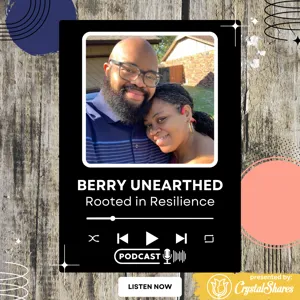Podcast Summary
The Clutch membership program is reopening with new features: Join The Clutch for an up-leveled experience with new courses, modules, and coaching exercises on topics impacting women's lives. Sign up on the waitlist to secure your spot.
The Unfuck Your Brain podcast is reopening its membership program, The Clutch, with new and improved features. The host, a Harvard Law School graduate and feminist, has revamped the entire experience with new courses, modules, and coaching exercises on various topics impacting women's lives. The new member site is beautifully organized and will offer an up-leveled experience for those who join. The open registration period will only last for a few days, so those interested should sign up on the waitlist at unfuckyourbrain.com/theclutch or text their email to +13479971784 with the code word "theclutch." The host is particularly excited about the new CLED students and plans to focus on their experience during this period. She also mentioned her excitement about the changing seasons and shared her thoughts on defensiveness.
Being open to feedback from valued sources: Recognizing the value of constructive criticism from aligned perspectives can lead to significant growth and a deeper understanding of complex issues.
Being open to constructive criticism, especially from those whose perspectives align with our values, can lead to significant growth without triggering a defensive response. The speaker, who has worked on overcoming defensiveness in her own life, shares her experience of receiving feedback from her students on two podcast episodes. The feedback focused on the importance of recognizing the unique challenges faced by different communities and the potential consequences of letting small issues go unaddressed. Despite the sensitivity of the topics and the fact that the feedback came from respected individuals, the speaker did not feel defensive. Instead, she saw it as an opportunity to learn and expand her understanding. This experience highlights the importance of being open to feedback, especially when it comes from those whose perspectives align with our values, and the potential benefits of doing so, including personal growth and a deeper understanding of complex issues.
Understanding Defensiveness: Recognizing defensiveness can lead to self-awareness, improved relationships, and the ability to handle diverse perspectives.
Defensiveness is a common response to perceived attacks or criticisms, and it can hinder personal growth and relationships. Defensiveness can manifest as feelings of fear, anger, or shame, and it's often difficult for people to recognize it in themselves. The causes of defensiveness include the release of chemicals in the brain and the perception of new information as a personal attack. To overcome defensiveness, it's important to recognize the signs and work on processing feedback without feeling the need to defend oneself. This skill can lead to greater self-awareness, improved relationships, and the ability to handle diverse perspectives and opinions. Remember, it's okay to feel defensive, but with practice, we can learn to respond more skillfully.
Understanding Defensiveness: The Brain's Reaction to New Information: Our brains can defensively resist new information due to cognitive dissonance, energy preservation, and evolutionary tendencies. Awareness of defensiveness can lead to open-mindedness, effective communication, and personal growth.
Our brains are wired to resist new information and can react defensively when challenged, especially if it feels like a threat to our self-concept or evokes feelings of shame or rejection. This resistance is due to cognitive dissonance, our brains' preference for preserving energy and maintaining existing beliefs, and our evolutionary tendency to avoid rejection. The defensive response can manifest in various ways, from doubling down on original beliefs to immediate agreement to preserve connection, or even feeling attacked and needing to defend oneself. It's essential to recognize defensiveness and understand its root causes to foster open-mindedness, effective communication, and personal growth.
Understanding Defensiveness and Receptiveness: Defensiveness hinders productive communication and learning, while receptiveness fosters growth and understanding. Practice being open to others' feedback and perspectives without assuming bad intentions.
Defensiveness can manifest in various ways, including a strong urge to argue or disagree, feeling resentful, wanting to shut down conversations, and fixating on the delivery rather than the content of a message. The opposite of defensiveness is receptiveness, which means being genuinely interested and open to others' feedback and thoughts without assuming bad intentions or taking it personally. Defensiveness often stems from a fear of losing our opinions or self-worth, especially in sensitive areas or when our perfectionism is involved. To overcome defensiveness, it's essential to practice receptiveness and understand that allowing others' opinions doesn't mean shaming ourselves or agreeing with them. Instead, it's an opportunity to learn and grow.
Being defensive when receiving feedback: It's natural to feel defensive, but remember people have autonomy to express opinions, and being open to hearing different perspectives doesn't mean always agreeing. Pause and reflect before reacting to promote personal growth.
While it's natural to feel defensive when receiving feedback or critique, low self-esteem and a conditioned belief in the need to be right can make it difficult to tolerate and hear contradictory views. This reaction, rooted in shame, can hinder personal growth and limit the ability to learn from others. However, it's essential to remember that people have the autonomy to think and express their opinions, and we have the power to decide when and how to engage with them. Disagreement is a natural part of human interaction, and being open to hearing different perspectives doesn't mean always agreeing. To work on becoming more receptive, notice the physical signs of defensiveness in your body and take a moment to pause and reflect before reacting. Remember, nobody is perfect, and neither are their opinions.
Understanding Defensiveness and Emotional Regulation: Acknowledge emotions, ask for a moment to respond, and practice self-acceptance to respond thoughtfully to feedback instead of centering yourself and being defensive.
Expressing your emotions and taking a moment to regulate yourself before responding is not centering yourself, but rather a necessary and respectful way to process feedback. It's important to understand that centering yourself means making everything about you and being unable to hear criticism, while acknowledging your emotions and asking for a moment to respond thoughtfully shows respect for the person offering feedback. Additionally, understanding the root causes of defensiveness, such as fear and shame, and practicing self-acceptance, self-compassion, and self-forgiveness can help resolve long-term defensiveness. In the moment, techniques like noticing emotions, asking why you feel defensive, and getting curious about your thoughts can help you respond thoughtfully.
Cultivating Self-Acceptance for Healthy Feedback: Practice self-acceptance, self-compassion, and self-forgiveness to reduce emotional drama from feedback and make personal growth without relying on others' approval.
Our relationship with ourselves plays a crucial role in how we handle feedback and make amends for mistakes. By practicing self-acceptance, self-compassion, and self-forgiveness, we can avoid making our self-worth dependent on others' approval and reduce emotional drama when receiving criticism. This shift in perspective allows us to reflect on the feedback, decide on actions, and continue growing without being hindered by defensiveness or negative emotions. The Clutch, a podcast community, can be a valuable resource for individuals seeking guidance on applying these concepts to their lives and connecting with like-minded individuals.





![Caffeine Cast: Why Confidence Isn’t a ‘Thing’ (& What it Really is) [Business, mindset, entrepreneur, disruptors]](https://www.podcastworld.io/podcast-images/disruptors-kt0uj0xy.webp)
